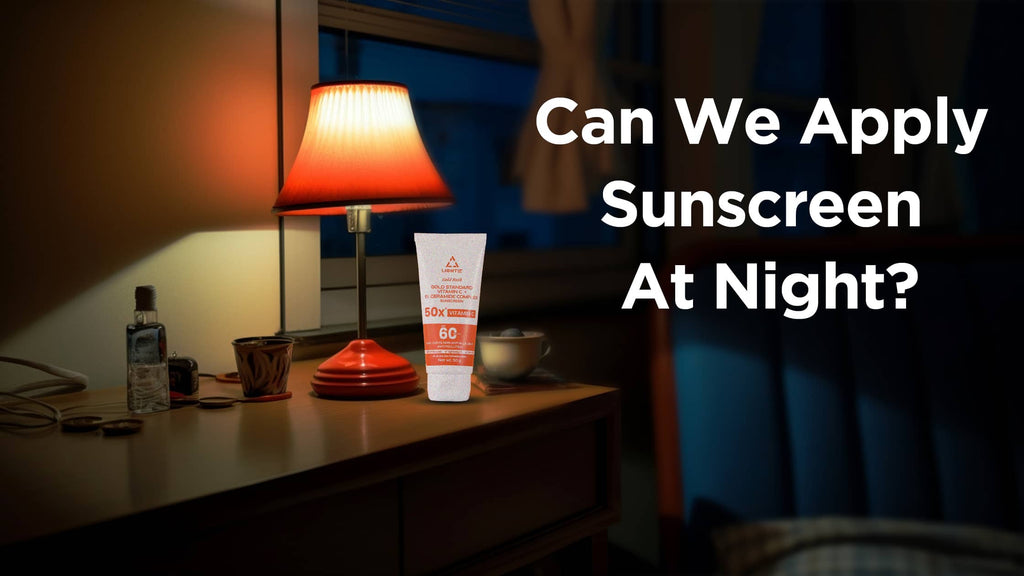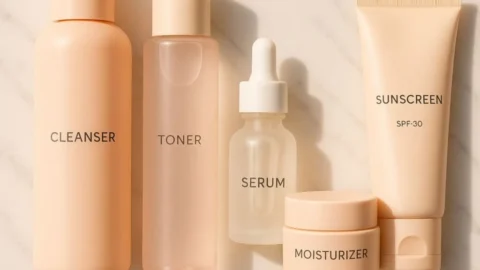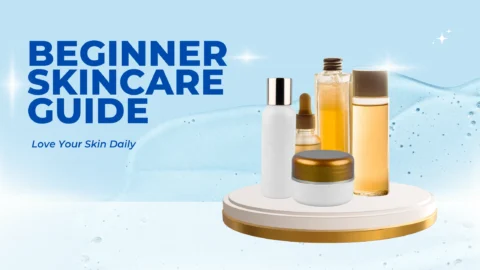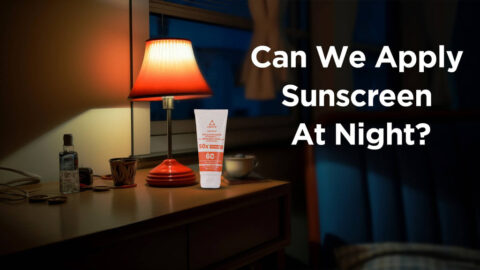
CAN WE APPLY SUNSCREEN AT NIGHT ? KNOW THE REAL FACTS!
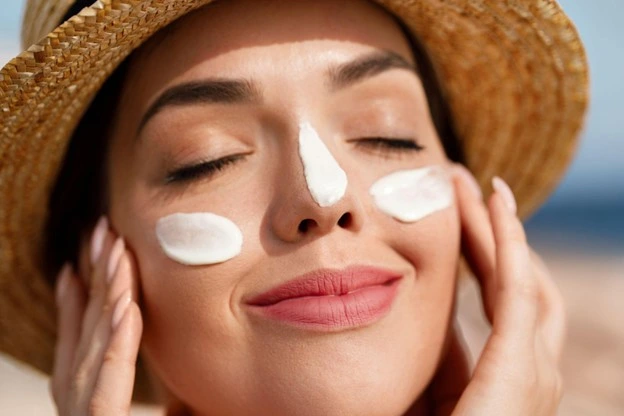
SUNSCREEN is a daytime staple for protecting your skin from UV rays, but a question that is being buzzing lately : CAN WE APPLY SUNSCREEN AT NIGHT ?
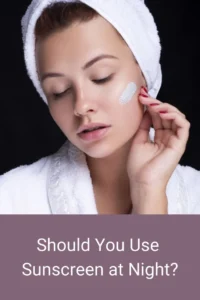
Applying sunscreen at night is generally not necessary and not recommended unless there’s a specific reason. HERE’S WHY :
WHY YOU DON'T NEED SUNSCREEN AT NIGHT ?
NO UV EXPOSURE :
Sunscreens are designed to protect your skin from UV radiation ( UVA and UVB ), which comes from the sun. At night, there’s no sun, so there’s no UV exposure.
CAN CLOG PORES :
some sunscreens, especially those with heavier formulations or added water resistance, can clog pores if left on overnight, potentially causing breakouts.
WHAT DOES SUNSCREEN DO ?
Sunscreen protects your skin from ULTRAVIOLET (UV) rays – UVA ( aging rays) and UVB ( burning rays ) – which comes from the sun and , to a lesser extent, artificial sources like tanning beds. It works in two ways :
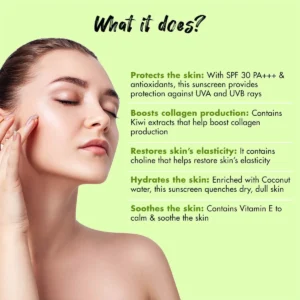
CHEMICAL SUNSCREENS :
Chemical sunscreen, also known as organic sunscreen, protects the skin by absorbing ULTRAVIOLET (UV) rays. the active ingredients, such as avobenzone, oxybenzone, octinoxate, and others, penetrate the skin and absorb UV radiation, converting it into heat, which is then released from the skin.
What is avobenzone, oxybenzone and octinoxate:
Avobenzone : Avobenzone absorbs UVA rays. Oxybenzone : Oxybenzone offers broad -spectrum protection against both UVA and UBA rays. Octinoxate : Octinoxate mainly blocks UVB rays.
PHYSICAL SUNSCREENS :
Physical sunscreen, also called mineral sunscreen, protects the skin by sitting on its surface and physically reflecting or scattering harmful UV rays. It uses natural mineral ingredients like zinc oxide or titanium dioxide as active components.
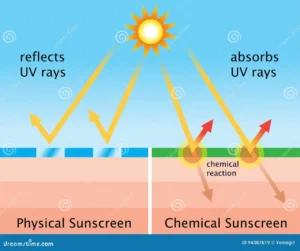
WHY PEOPLE ASK : CAN WE APPLY SUNSCREEN AT NIGHT ?
The question stems from a mix of curiosity and confusion. Here are some reasons it’s trending :
Misunderstanding UV Exposure:
Some think UV rays linger or that indoor lights emit them.
Extra Protection Mindset:
Others believe sunscreen offers a “bonus shield” against pollution or blue ligh
Skincare Layering Trends:
With multi – step routines, people wonder if SPF fits into PM regimens.
WHAT IS SPF ?

When it comes to skincare, one of the most talked about – and often misunderstood – terms is SPF. You have probably seen it printed on sunscreen bottles, moisturizers, and even makeup. But what exactly does SPF mean, and why is it so important for your skin ? Let’s break it down :
What does SPF Stand For?
SPF stands for Sun Protection Factors. It’s a measure of how well a product protects your skin from the sun’s UVB rays – the rays responsible for causing sunburn.
Simply put, SPF tells you how long you can stay in the sun without getting burned when using the product, compared to how long could stay without protection. FOR EXAMPLE :
- SPF 15 means you can stay in the sun 15 times longer without burning.
- SPF 30 gives 30 times the protection.
- SPF 50 gives 50 times the protection.
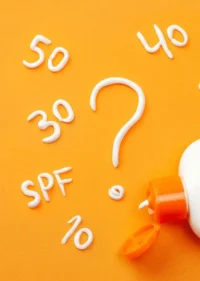
SUNSCREEN AND BLUE LIFGHT : Does It Help?
Traditional sunscreens are formulated to protect against UVB (burning rays ) and UVA (aging rays). However, not all sunscreens protect against blue light. For blue light protection, you need products that :
- Contain Iron Oxides : These mineral pigments help shield the skin from visible light, especially in tinted sunscreens.
- Include Antioxidants : Ingredients like vitamin C, niacinamide, and green tea extract can neutralize oxidative stress caused by blue light.
- Offer Broad – spectrum or digital defence : Some newer sunscreens are specifically formulated to block HEV light from screens and artificial lighting.
IS SUNSCREEN ONLY FOR THE DAY ? BREAKING COMMON SKINCARE MYTHS !
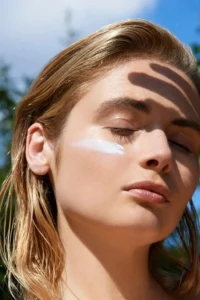
Many people believe sunscreen is only needed during the day or when outdoors, but that’s not entirely true. While UV rays are strongest during daylight and minimal at night, UVA rays can still penetrate windows, meaning sunscreen might be useful even indoors.
Some modern sunscreens also protect blue light from phones and screens, which may contribute to skin aging. However, sunscreen isn’t usually necessary at night unless you are exposed to artificial lighting for long hours or using a dual – purpose product.
Sunscreen is essential during the day, optional indoors depending on light exposure, and generally unnecessary at night.
CHOOSING THE RIGHT SUNSCREEN FOR YOUR SKIN TYPE !
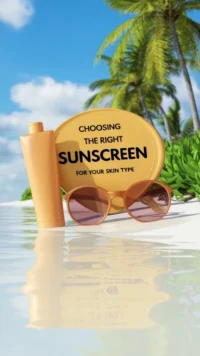
SUNSCREEN FOR OILY SKIN !
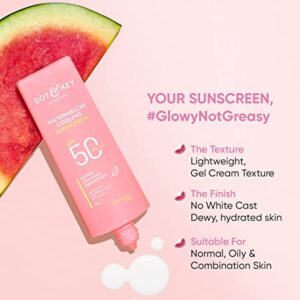
SUNSCREEN FOR ACNE PRONE SKIN !
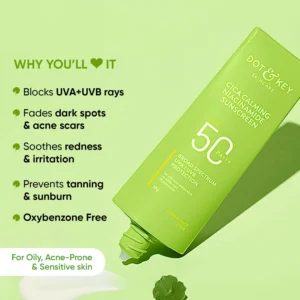
SUNSCREEN FOR ALL SKIN TYPE!
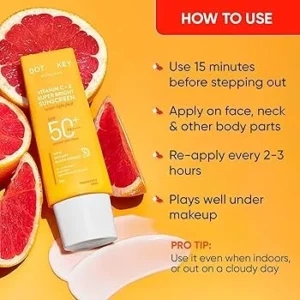
HOW TO USE SUNSCREEN CORRECTLY ?
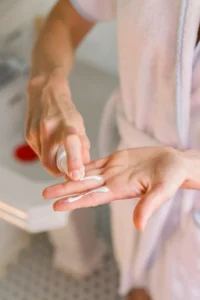
- Choose the right sunscreen according to your skin type :
- Broad – spectrum ( UVA and UVB protection )
- SPF 30 or higher
- Suitable for your skin type ( oily, dry, sensitive, etc )
- Use enough product : Apply about 2 finger lengths for your face and neck.
- About 1 ounch ( a shot glass ) for the entire body.
- Apply 15-30 minutes before sun exposure : Gives your skin time to absorb the sunscreen fully.
- Don’t forget key areas like : Ears, Neck, Back of hands, etc.
- Reapply every 2 hours.
FREQUENTLY ASKED QUESTIONS ( FAQs )

-
1. Will wearing sunscreen at night harm my skin ?
Answer. Most sunscreen won't harm your skin if worn overnight, but some sunscreens may clog pores or cause irritation, especially if they're formulated for daytime use ( e.g. water-resistant or heavy formulas ). It's better to use a night cream or moisturizer designed for nighttime skin care.
-
2. Are there any benefits of using sunscreen at night ?
Answer. Unless it contains beneficial ingredients like niacinamide, hyaluronic acid, or antioxidants, sunscreen does not offer specific nighttime benefits.
-
3. What should i use on my skin at night instead of sunscreen ?
Answer. Use a night moisturizer, hydrating serum, or products containing retinol, peptides, or antioxidants that support skin regeneration during sleep. These are more suitable and effective than sunscreen at night.
-
4. Can sunscreen cause acne ?
Answer. Some sunscreen can clog pores. Choose non - comedogenic, oil free, or gel based formulas if you have acne prone skin.
-
5. Is sunscreen safe for children and babies ?
Answer. Sunscreen is safe for children over 6 months. For babies under 6 months, keep them out of sunlight and dress them in protective clothing.
If you have any query related foundation do check this : Best Foundation For Oily Skin In India




